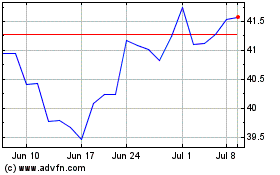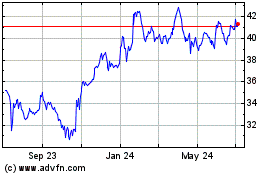As chief executive of Massey Energy, Don Blankenship would hand
out cans of Dad's root beer to employees he was unhappy with and
explain that D-A-D-S stood for "Do As Don Says."
He explained the gesture as a good-natured reminder. "It's a
little bit easier to insist on people following the directions when
you do it in a fun way," Mr. Blankenship has said.
Few people would dispute that Mr. Blankenship, who once ran the
biggest coal company in Central Appalachia, was a micromanager and
a formidable boss. Whether his intense style also fueled a
conspiracy to violate federal workplace-safety laws ahead of the
worst U.S. coal-mining disaster in four decades will now be a
question for a jury to decide.
Prosecutions of CEOs are unusual, but not unheard of. Bernard
Ebbers was convicted in 2005 for securities fraud at MCI WorldCom
and sentenced to 25 years. Last month, Stewart Parnell, the former
owner of Peanut Corp. of America, was sentenced to 28 years, after
being convicted of presiding over a cover-up of salmonella
contamination in the company's products.
Mr. Blankenship, 65 years old, is the first CEO of a major U.S.
corporation to be charged criminally for conspiring to violate
workplace-safety rules following a deadly industrial accident, say
safety experts. Without tying Mr. Blankenship to the 2010 blast at
Massey's Upper Big Branch mine, in which 29 miners were killed, the
U.S. attorney in Charleston, W.Va., has said Mr. Blankenship
undermined safety at the company in the months before the
accident.
Mr. Blankenship has pleaded not guilty and vehemently denied the
charges in court filings leading up to a trial, which is set to
begin on Thursday.
"To elevate what is essentially an allegation of corporate
mismanagement into a federal crime is unprecedented," his lead
attorney, William Taylor, wrote in one filing earlier this
year.
Most of the charges against Mr. Blankenship, who faces a 30-year
maximum prison sentence, are tied to allegations of lying to the
Securities and Exchange Commission and investors about Massey's
safety record.
But the safety-related count against him is gaining the most
attention from legal experts, in part because of its rarity.
Between 1970 and 2008, company officials served a total of 42
months in all criminal prosecutions brought under the Occupational
Safety and Health Act, according to experts and federal records.
Since then, three officials have received prison terms for lying to
federal inspectors or falsifying safety documents, according to a
list of cases provided by the Labor Department. No CEO of a public
company has faced criminal charges for violating the nation's
current mine-safety laws since those were passed in 1977, say
experts.
"Successful prosecution of Blankenship will embolden prosecutors
to pursue similar cases," said David Uhlmann, a University of
Michigan law professor who served in the Justice Department under
former President George H.W. Bush.
Mr. Blankenship has long said that he expected retribution for
his antagonistic stance toward regulators investigating the UBB
disaster. "If they put me behind bars, it will be political," he
wrote on his personal website in 2013.
The prosecution's case is likely to focus largely on Mr.
Blankenship's direct involvement in decisions that affected safety
at Massey, which was the nation's fourth-largest coal operation in
2010 with $3 billion in revenue and 56 mines in West Virginia,
Kentucky and Virginia.
In a 41-page indictment, prosecutors cite a drumbeat of
handwritten memos by Mr. Blankenship allegedly urging managers to
keep the coal flowing at the highly profitable UBB mine. He weighed
in on decisions as small as whether to spend $750 to check
freeze-proofing systems at the UBB mine.
Many who worked with Mr. Blankenship, a former accountant,
attest to his uncanny grasp of numbers and operational details.
"He was a very thorough manager, and he was involved with all
major decisions," said E. Morgan Massey, the company's former
chairman. "You can call that micromanagement, but he spent 100% of
the time on the job, day and night."
Jeff Wilson recalled that when he was directing the construction
of the complex that would clean the coal mined at UBB, a $55
million project that took nearly a year, Mr. Blankenship would
often arrive by helicopter and stay until dark.
"Every morning, you would hear wha-wha-wha," Mr. Wilson said,
mimicking the blades of a helicopter. "Here he comes."
Mr. Wilson, who now runs his own energy consulting business in
Richmond, Va., prospered at Massey. But even so, he said Mr.
Blankenship would hand him a can of Dad's root beer when he wasn't
pleased. "It was a good prop, and it was effective," Mr. Wilson
said. "I was lucky I only got one can at a time."
Messrs. Massey and Wilson said they never saw Mr. Blankenship
order anyone to skirt safety laws.
Prosecutors, however, allege that Massey officials illegally
tipped off miners about imminent inspections so workers could fix
hazards and avoid fines and shutdowns. They also claim officials
falsified coal-dust samples. A buildup of coal dust was behind the
2010 explosion, state and federal investigators later
determined.
"You need to get low on UBB #1 and #2 and run some coal. We'll
worry about ventilation or other issues at an appropriate time,"
Mr. Blankenship wrote in one note cited in the indictment.
In another note, he reminded the group president who oversaw
UBB: "You have a kid to feed. Do your job."
Write to Kris Maher at kris.maher@wsj.com
Subscribe to WSJ: http://online.wsj.com?mod=djnwires
(END) Dow Jones Newswires
September 30, 2015 21:15 ET (01:15 GMT)
Copyright (c) 2015 Dow Jones & Company, Inc.
Verizon Communications (NYSE:VZ)
Historical Stock Chart
From Aug 2024 to Sep 2024

Verizon Communications (NYSE:VZ)
Historical Stock Chart
From Sep 2023 to Sep 2024
